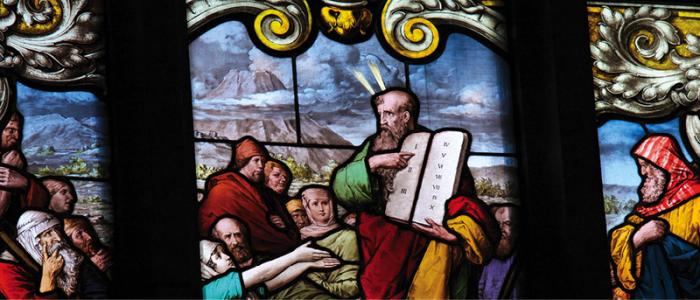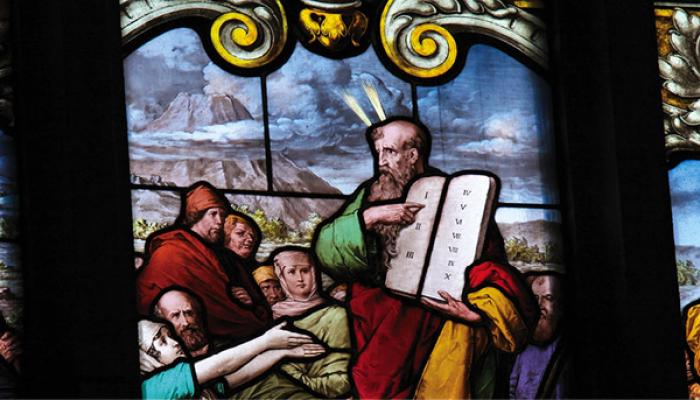
1.19 A duhet t’i ndjek të gjitha rregullat e Biblës?
Jezusi nuk erdhi në tokë për të shlyer ligjet e Besëlidhjes së Vjetër, por për t’i përmbushur ato. Besëlidhja e Re hedh dritë mbi Besëlidhjen e Vjetër. Disa ligje biblike nuk zbatohen më sepse Jezusi na dha një ligj më të lartë, i cili bazohet në dashurinë për të afërmin. Një shembull: Jezusi na thotë se është më mirë t’i duam armiqtë tanë, sesa të kërkojmë hakmarrje kur na ndodh diçka e keqe.
Të tjera ligje, si Dhjetë Urdhërimet, janë ende të vlefshme. Kisha, e udhëhequr nga Shpirti Shenjt, na ndihmon të kuptojmë cilat ligje janë ende të vlefshme e cilat jo.
Pse Shkrimi i Shenjtë e mëson të vërtetën?
Sepse vetë Hyji është autori i Shkrimit të Shenjtë: për këtë arsye ai quhet i frymëzuar dhe mëson pa gabime ato të vërteta, që janë të nevojshme për shpëtimin tonë. Në fakt, Shpirti i Shenjt i ka frymëzuar autorët njerëzorë, të cilët kanë shkruar atë që Ai ka dashur të na mësojë. Megjithatë, feja e krishterë, nuk është “një religjion i Librit”, por i Fjalës së Hyjit, që nuk është “një fjalë e shkruar dhe memece, por Fjala e mishëruar dhe e gjallë” (Shën Bernard i Kiaravales). [KKKP 18]
How can Sacred Scripture be “truth” if not everything in it is right?
The Bible is not meant to convey precise historical information or scientific findings to us. Moreover, the authors were children of their time. Their forms of expression are influenced by the sometimes inadequate cultural images of the world around them. Nevertheless, everything that man must know about God and the way of his salvation is found with infallible certainty in Sacred Scripture. [Youcat 15]
What is the unity that exists between the Old and the New Testaments?
Scripture is one insofar as the Word of God is one. God’s plan of salvation is one, and the divine inspiration of both Testaments is one. The Old Testament prepares for the New and the New Testament fulfills the Old; the two shed light on each other. [CCCC 23]
What significance does the Old Testament have for Christians?
In the Old Testament God reveals himself as the Creator and preserver of the world and as the leader and instructor of mankind. The Old Testament books are also God’s Word and Sacred Scripture. Without the Old Testament, we cannot understand Jesus.
In the Old Testament a great history of learning the faith begins, which takes a decisive turn in the New Testament and arrives at its destination with the end of the world and Christ’s second coming. The Old Testament is far more than a mere prelude for the New. The commandments and prophecies for the people of the Old Covenant and the promises that are contained in it for all men were never revoked. In the books of the Old Covenant we find an irreplaceable treasure of prayers and wisdom; in particular, the Psalms are part of the Church’s daily prayer. [Youcat 17]
What significance does the New Testament have for Christians?
In the New Testament God’s revelation is completed. The four Gospels according to Matthew, Mark, Luke, and John are the centerpiece of Sacred Scripture and the most precious treasure of the Church. In them the Son of God shows himself as he is and encounters us. In the Acts of the Apostles we learn about the beginnings of the Church and the working of the Holy Spirit. In the letters written by the apostles, all facets of human life are set in the light of Christ. In the Book of Revelation we foresee the end of the ages.
Jesus is everything that God would like to tell us. The entire Old Testament prepares for the Incarnation of God’s Son. All of God’s promises find their fulfillment in Jesus. To be a Christian means to unite oneself ever more deeply with the life of Christ. To do that, one must read and live the Gospels. Madeleine Delbrêl says, “Through his Word God tells us what he is and what he wants; he says it definitively and says it for each individual day. When we hold our Gospel book in our hands, we should reflect that in it dwells the Word that wants to become flesh in us, desires to take hold of us, so that we might begin his life anew in a new place, at a new time, in a new human setting.” [Youcat 18]
Zoti ynë Jezu Krisht, siç e tha vetë në Ungjill, na ka nënshtruar zgjedhës dhe barrës së tij, të cilat janë të lehta . Prandaj, ai i ka vënë shoqërisë së popullit të tij të ri detyrimin e ... çdo gjëje që vlerësohet në shkrimet kanonike, me përjashtim të atyre barrave që gjenden në pesë librat e Moisiut, të cilët i imponuan popullit të lashtë një skllavëri në përputhje me karakterin e tyre dhe kohët profetike në të cilat ata jetuan. [Shën Agustini, Letra, Nr. 54 (ML 33, 200)]





